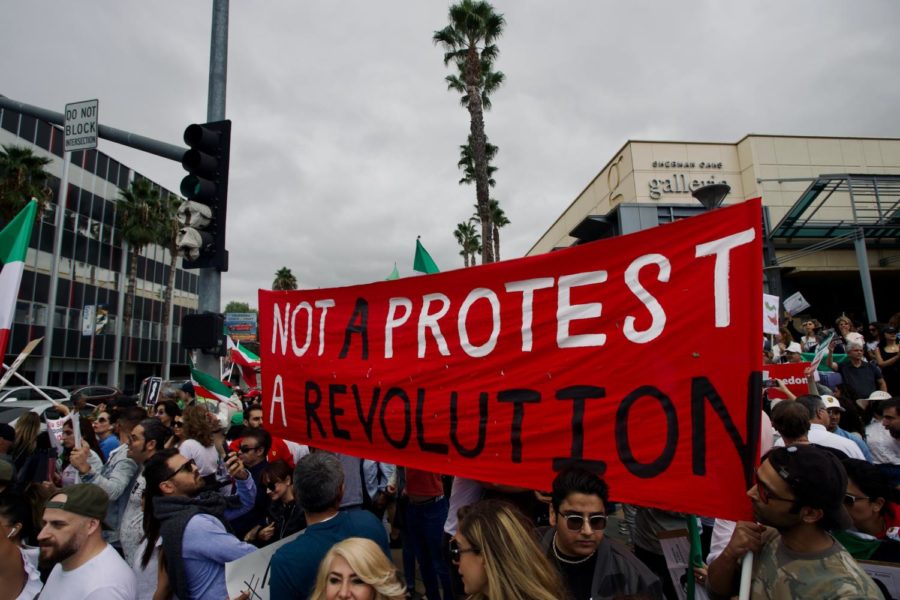Elnaz Rekabi: the Iranian Female Climber Who Defied Iran and Competed Without a Hijab
November 2, 2022
Protests in Iran, initially sparked by the death of Mahasa Amini for not correctly wearing her hijab, have continued into their fifth week, as demonstrations by Iranian rights activists endure. Recently attention has turned to a competitive climber, Elnaz Rekabi, who represented Iran in the finals of the International Federation of Sport Climbing’s Asia Championship, in Seoul, South Korea. Demonstrators and women, among many others, have since hailed Rekabi as an inspiration for competing without a hijab and defying the strict dress code that is legally required of women by Iran’s theocratic government. However, many have grown concerned over the safety of Rekabi as her whereabouts following the competition are unclear, and the top-placed Iranian climber may be subject to consequences from the government or security officers.
The 33-year-old competed in the tournament wearing her hair in a ponytail with a black headband, finishing fourth in the boulder and lead category. Sports in Iran broadly operate under a series of semi-governmental organizations. Despite being overseas, Iran still requires female athletes, regardless of their specific sport, to wear a head covering, such as a hijab.
When questioned by Iran’s hardline state TV about defying the dress code, Rekabi told them that it was an “unintentional act” (AP News), which she had reiterated on a social media account. Rekabi further explained, “Because I was busy putting on my shoes and my gear, it caused me to forget to put on my hijab and then I went to compete” (AP News). Rekabi’s responses appear to be emotionless and careful, which may have been due to what Iranian rights activists refer to as ‘coerced confessions’, in which people may feel pressured by the Iranian government when they are being interviewed on state TV.
After departing from Seoul on Tuesday the 18th, Rekabi was greeted by hundreds gathered outside the Imam Khomeini International Airport, in her hometown of Tehran. The supporters consisted of women without hijabs or similar head coverings. Rekabi was cheered for by supporters, calling her ‘Elnaz the Champion.’ Rekabi explained to Iran’s state media that “I came back to Iran with peace of mind although I had a lot of tension and stress. But so far, thank God, nothing has happened” (AP News).
Following her appearance at the airport, Rekabi’s recent activity has been unclear and contested by many. The semi-official news agency, Islamic Society of North America, said Rekabi had met with Hamid Sajjadi, a sports minister, who encouraged her to keep competing. According to BBC Persian, Iranian officials have since confiscated Rekabi’s phone and passport, additionally reporting that her flight was scheduled to return to Iran on Wednesday, the 19th, but was moved up unexpectedly.
Furthermore, the International Olympic Committee held a meeting with Iranian officials and the International Federation of Sport Climbing, in which the IOC said that it had received “clear assurances that Ms. Rekabi will not suffer any consequences and will continue to train and compete,” and described that Rekabi was with her family and had joined a call with officials. Some people are doubtful about this, however, as other athletes have faced harassment throughout the period of protest in Iran.
Furthermore, The Iranian Embassy in Seoul denies “all the fake, false news and disinformation” (AP News) regarding Rekabi’s unclear departure and potential mistreatment by officials. Additionally, on Wednesday, a small group of protestors gathered in front of the embassy in Seoul. Women cut locks off their hair as a demonstration in support of the ongoing protests in Iran and Rekabi. According to human rights groups, over two hundred people have been killed during the protests in Iran, however, due to the Iranian government restricting virtually all internet access, as well as the detainment of about forty journalists (Committee to Protect Journalists), it is difficult to compile concrete information regarding the effects of the protests on Iranians.



